Design decisions for buildings and communities are critical to efforts to increase local and regional resiliency. Building designers — of residential, institutional, and commercial structures — should strive to incorporate passive and active survivability concepts into new and renovated structures.
Community planners and developers need to incorporate concepts that increase the capacity to maintain transportation flow, strategies to handle water management, and infrastructure approaches that will withstand a variety of risks.
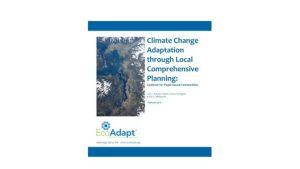
Adaptation Through Local Comprehensive Planning: Guidance for Puget Sound Communities
This extensive guidance document was developed as a result of a vulnerability assessment and local comprehensive plan update process undertaken by the City of Bainbridge Island, which worked with the climate consulting firm EcoAdapt.
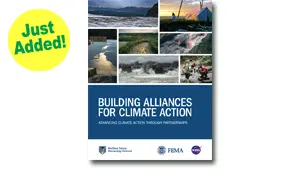
Building Alliances for Climate Action
FEMA’s Building Alliances for Climate Action is a guide that provides resources, insights, and stories to help people and organizations address climate change.
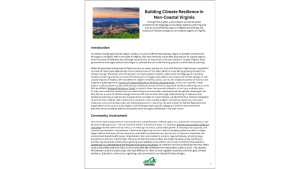
Building Climate Resilience in Non-Coastal Virginia
This report identifies four relevant categories of actions that could be taken to promote resilience in non-coastal Virginia: community organizing, education initiatives, economic productivity, and improving access to resources.
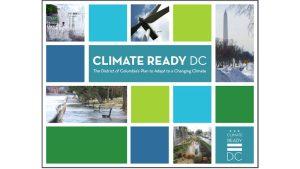
Climate Ready DC: The District of Columbia’s Plan to Adapt to a Changing Climate
Climate Ready DC is the District of Columbia’s strategy to make the District more resilient to future climate change while helping to ensure that our city continues to grow greener, healthier, and more livable.
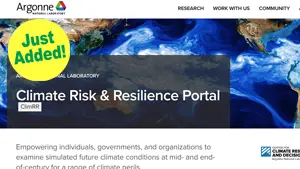
Climate Risk & Resilience Portal (ClimRR)
The Climate Risk & Resilience Portal from Argonne National Laboratory empowers individuals, governments, and organizations to examine simulated future climate conditions at mid- and end-of-century for a range of climate perils.

Envision Rating System for Sustainable Infrastructure
Published in 2015, the Envision system is composed of tools, covering all aspects of a product’s lifecycle, that are meant to introduce sustainability into infrastructure projects.
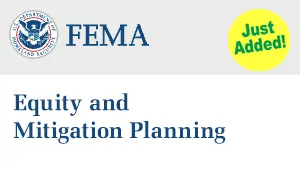
Equity and Mitigation Planning
Mitigation planning creates a pathway to reduce vulnerabilities. State, local, tribal and territorial governments engage underserved communities, populations, neighborhoods, and census tracts as mitigation plans are developed and updated. Together, stakeholders participate in mitigation planning to develop and adopt mitigation solutions.
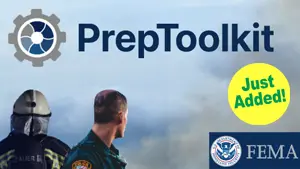
FEMA Preparedness Toolkit
The National Preparedness System outlines an organized process for everyone in the whole community to move forward with their preparedness activities and achieve the National Preparedness Goal.
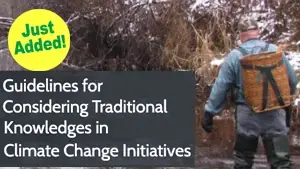
Guidelines for Considering Traditional Knowledges in Climate Change Initiatives
Guidelines for Considering Traditional Knowledges in Climate Change Initiatives is an informational resource for tribes, agencies, and organizations across the United States interested in understanding traditional knowledges—or TKs—in the context of climate change.
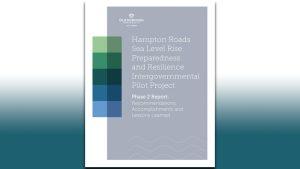
Hampton Roads Sea Level Rise Preparedness and Resilience Intergovernmental Pilot Project
After two years, the Hampton Roads Sea level Rise and Resilience Intergovernmental Planning Pilot Project (Intergovernmental Pilot Project or IPP), convened at Old Dominion University, has come to a successful close. The key deliverables include a whole of government mitigation and adaptation planning process and an integrated regional recommendation, both which can serve as a template for other regions.

Adaptation Through Local Comprehensive Planning: Guidance for Puget Sound Communities
This extensive guidance document was developed as a result of a vulnerability assessment and local comprehensive plan update process undertaken by the City of Bainbridge Island, which worked with the climate consulting firm EcoAdapt.

Building Alliances for Climate Action
FEMA’s Building Alliances for Climate Action is a guide that provides resources, insights, and stories to help people and organizations address climate change.

Building Climate Resilience in Non-Coastal Virginia
This report identifies four relevant categories of actions that could be taken to promote resilience in non-coastal Virginia: community organizing, education initiatives, economic productivity, and improving access to resources.

Climate Ready DC: The District of Columbia’s Plan to Adapt to a Changing Climate
Climate Ready DC is the District of Columbia’s strategy to make the District more resilient to future climate change while helping to ensure that our city continues to grow greener, healthier, and more livable.

Climate Risk & Resilience Portal (ClimRR)
The Climate Risk & Resilience Portal from Argonne National Laboratory empowers individuals, governments, and organizations to examine simulated future climate conditions at mid- and end-of-century for a range of climate perils.

Envision Rating System for Sustainable Infrastructure
Published in 2015, the Envision system is composed of tools, covering all aspects of a product’s lifecycle, that are meant to introduce sustainability into infrastructure projects.

Equity and Mitigation Planning
Mitigation planning creates a pathway to reduce vulnerabilities. State, local, tribal and territorial governments engage underserved communities, populations, neighborhoods, and census tracts as mitigation plans are developed and updated. Together, stakeholders participate in mitigation planning to develop and adopt mitigation solutions.

FEMA Preparedness Toolkit
The National Preparedness System outlines an organized process for everyone in the whole community to move forward with their preparedness activities and achieve the National Preparedness Goal.

Guidelines for Considering Traditional Knowledges in Climate Change Initiatives
Guidelines for Considering Traditional Knowledges in Climate Change Initiatives is an informational resource for tribes, agencies, and organizations across the United States interested in understanding traditional knowledges—or TKs—in the context of climate change.

Hampton Roads Sea Level Rise Preparedness and Resilience Intergovernmental Pilot Project
After two years, the Hampton Roads Sea level Rise and Resilience Intergovernmental Planning Pilot Project (Intergovernmental Pilot Project or IPP), convened at Old Dominion University, has come to a successful close. The key deliverables include a whole of government mitigation and adaptation planning process and an integrated regional recommendation, both which can serve as a template for other regions.
